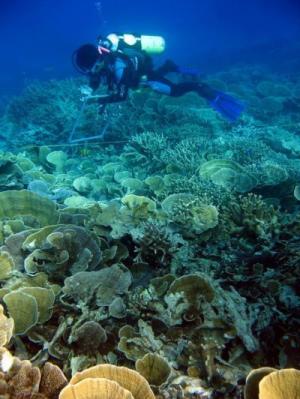From:TheBahamasWeekly.com
Coral Scientists Use New Model to Find Where Corals Are Most Likely to Survive Climate Change
By ScienceDaily.com
Aug 31, 2012 - 8:28:59 AM

This image shows a WCS conservationist conducting research on coral reef systems in Indonesia's Karimunjawa Marine Park. Using a new coral assessment method for measuring resilience, a team of researchers have found that heat-tolerant coral species living in locations with wide temperature variations are most likely to survive in regions impacted by climate change. (Credit: Fakhrizal Setiawan)
|
ScienceDaily (Aug. 29, 2012) — Marine conservationists from the Wildlife Conservation Society working with other coral reef experts have identified heat-tolerant coral species living in locations with continuous background temperature variability as those having the best chance of surviving climate change, according to a new simplified method for measuring coral reef resilience.
Therefore, coral reefs with these characteristics should receive immediate attention for conserving this highly threatened ecosystem, according to the authors of a study appearing August 30 in the online journal PLoS ONE.
The bewildering diversity of coral reef environments has made assessing and prioritizing them costly, and yet they require immediate action to respond to the threats of climate change. Combining expert opinion and scientific evidence, the scientists developed a simplified assessment that reduces this complexity to 11 key and easily measured factors. This finding greatly simplifies and reduces the time needed for assessments and, therefore, gives coral reef managers a cost-effective, evidence-based tool for gauging a reef's chances of survival.
"Coral reefs are astoundingly complex systems," said Dr. Tim McClanahan, lead author of the study and head of WCS's coral reef research and conservation program. "This reality sometimes leads to the assumption that evaluations and management strategies must also be complex. Our study reveals, however, that effective conservation decisions may hinge on a few easily measurable factors, and this can promote faster management actions."
The study streamlines a previous approach to measuring the resilience of coral reefs by squaring a currently used assessment models with expert opinions and existing data sets. Focusing on a comprehensive field study undertaken by WCS in Karimunjawa Marine Park, located on the coast of Java in Indonesia, McClanahan and his co-authors examined a previously employed complex and expensive assessment protocol that included over 60 factors -- herbivorous fish diversity, bio-erosion rates, hard coral cover, and many others -- in order to determine which factors were most important.
READ MORE
© Copyright 2012 by thebahamasweekly.com -